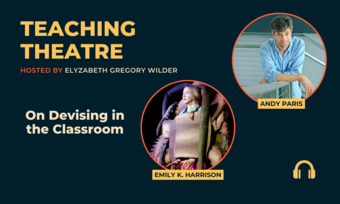Holler
Too Late for Law School?
Got issues? Of course you do. Keep’em coming—write to me at [email protected]. For previous Holler columns, go here.
Dear Holler,
Help! I'm at my wit's end. I just finished grad school in dramaturgy, and I can't find a job.
I've been following the conversation about class barriers to entry in the theater, and since I am writing anonymously, I am not afraid to say it: Damn straight! I was one of three grads this year form my (top-tier) MFA program—two of us are living off mom and dad while working unpaid or underpaid internships in the city, and then there's me—I'm working at Hallmark and sleeping on my ex's couch. I don't have a parental paycheck that can float me for a few months (or years) until I start earning those big dramaturgy bucks. And besides, if I asked my family for help, they'd repeat what they told me three years ago: that taking on obscene amounts of debt while the professional American theater slowly implodes was, to put it mildly, a misjudgment. And they'd be right.
I took a big leap of faith on this field and I'm not feeling the love back. I'm sorry to sound so desperate, but I feel I have no way in. I just can't afford to be entry-level in this field.
Sincerely,
Too Late For Law School?
Dear TLFLS,
Thank you for your passionate, important, and heart-wrenching letter. Normally when I get a letter like this I start by letting the writer know how lucky the American theater is to have him or her. To you I'll go further: the whole world is lucky to have you, and I'm confident that any circles you move in, be they the hallowed rehearsal halls of New York or the local branch of Hallmark Cards, are made better by your intellect and your courage. Your request is simple but powerful: you want to do the work you set out to do. You are not asking for a handout or a favor. But you find that even after undergrad and grad school, you still lack the magic key that would unlock the door to a career in the arts. Is that magic key talent, or grit, or ambition? Is it even beauty? No. In this case, that magic key is privilege.
What could be worse than being denied the opportunity to ply your well-earned trade because of disadvantages that you cannot control? Our field should be finding ways to embrace folks like you, but instead dominant paradigms like underpaid internships and New York or bust are designed to keep you out.
There has been recent conversation on HowlRound about this phenomenon, and I won't rehash it here except to say that it is very good that we are finally having this conversation. There are some great suggestions among the comments and in the accompanying Twitter chat, and surely this conversation is happening in the broader not-for-profit world as well, especially with the recent legal decisions about the definition of internship. Instead of rounding up those conversations and suggestions, I want to talk about keeping your faith in the theater. The job situation sucks, but here's the thing: you'll probably find a way to make it work. Maybe you'll have to scrimp and save those Hallmark paychecks for a few years, or maybe you'll earn some magical fellowship or land a well-paying job in a less desirable city. You'll make it happen, one way or another, you really will. I don't mean to be flippant, but that's not really the challenge. The challenge is: But then what? What happens the next time around, when the fellowship ends or the job disappears, and you are back to the same position you are in now? We are nomads here in the nonprofit sector—we tend not to stick around any place too long, and the negative effect of that is a life of constant searching, constant instability. You'll make it over this hump, but it won't be the last one. And your (presumably) tongue-in-cheek nom-de-plume about law school—or for some of us it's law school, for others it's advertising, for still others it's television—that possibility will float back up. You'll think about getting out. So how do you stay true to a field that won't necessarily stay true to you?
You'll make it over this hump, but it won't be the last one.
Maybe you don't. So what if you went to law school? Or worked for an ad firm for a few years? Sometimes our industry expects total unwavering commitment until the last dying breath. What you are learning right now, TLFLS, is that such an approach may not be practical. Or healthy. Would going to law school make you any less of a dramaturg? Or, would it mean simply that you were seeking a new legal perspective for your dramaturgy? Maybe our professional identities should be more porous. Maybe we should relax the “you're in / you're out” mentality. Maybe those dichotomies serve more to scare those on the fence out of the field completely, when really we should be broadening the tent to keep as many people in as possible. Being “well-rounded” was a good thing once upon a time, but when I look around New York, I see so many people that eat/sleep/drink/breathe only theater... Can that be good for our art form?
I see so many people that eat/sleep/drink/breathe only theater... Can that be good for our art form?
When I was in high school, I had a drama teacher who told us that if we could ever imagine doing anything else with our lives besides theater, we should go ahead and do that thing, because if so, we lacked the singularity of focus needed to stick it out. I didn't believe that then, although I watched many friends squeeze themselves into unforgiving BFA programs followed by unsatisfying careers believing that it was all the way or nothing at all. And, I don't believe it now. In my adult life, I've been a professional full-time artist, but I've also worked in journalism, advocacy, education, and, yes, retail. When I was working as a journalist, was I any less a theater artist? I say no. I was simply responding to the reality of the moment. I decided I was happier taking a year off to earn some money and broaden my perspective, rather than pursuing the kind of theater career that would pay my rent but not make me happy. This on-again off-again rhythm may have cost me some momentum, but it also afforded me the luxury of only working in theater when I really wanted to, and only in a way where I could maintain my integrity. I could be a theater artist on my own terms.
When I think of how you must feel about your two classmates from more advantaged backgrounds, I can completely empathize. They can afford to take those fancy below-minimum-wage internships in New York or Chicago, which might fast track them on a career path you can only dream about. But think about what you get that they don't get. You get the opportunity to ask yourself and the universe why you want this in the first place. You get the privilege of no auto-pilot. And you get the advantage of deciding that the answer does not have to be simply yes or no. It can be “Not now.” It can be “Only when it's a project I care about.” It can be “Yes, but not unless I can also pay off my debt.” It becomes a more holistic approach. And, on top of it all, you give yourself the gift of being a complete person, not just a career path. Because you didn't have the advantages that others had, you'll make your own. Your advantage becomes a deeper understanding of why you want to make theater in the first place. Your art becomes “How can I be an artist while selling you this greeting card?” Your privilege is self-understanding.
This may all sound like magical thinking. But it's important to determine if the solution to your frustration will be external or internal. If it's going to be external, then you better marry rich or start buying lotto tickets. Good, important conversations notwithstanding, the change we seek may not come fast enough to catch you up to your wealthier peers in this lifetime. So, then, the solution may be internal. That solution, I propose, will be harder won, but more deeply felt—a greater sense of who you are as a dramaturg, and, more importantly, as a human being.
Much love,
Holler
Bottom Line:
Don't try to be what you're not. The island you have is the island you've got. (Bathroom wall, Earwax Cafe, Chicago.) In other words, if being a full-time artist isn't in the cards, find a way to make the artistic life you are able to lead as valid, meaningful, and intentional as possible.













Comments
The article is just the start of the conversation—we want to know what you think about this subject, too! HowlRound is a space for knowledge-sharing, and we welcome spirited, thoughtful, and on-topic dialogue. Find our full comments policy here
This is painful to read. I'll begin by saying that a program perhaps shouldn't be considered "top-tier" if it leads it graduates to expect that there will be as many jobs *as dramaturgs* in the field as there are folks receiving "top-tier" training each year. Although I had any number of complaints about the education that I got at Yale, I have to say that the faculty were careful in my interview to be sure that I wasn't expecting that the promise of a career in regional theater dramaturgy came along with admission. (And, of the 8 dramaturgs in my class, only one of us is making a living as a regional theater dramaturg, although most of us are still active in the world of professional art.)
All aspiring artists need to learn that, despite the wealthiness of our culture, the artworld will not be waiting with open arms to hire each year's crop of freshly minted MFAs. (Or BFAs. Or BAs. Or whatever.) Those aspiring to work in the field should understand that they may well need to--or want to--build their careers and manage their professional trajectories. (Rule 1: there are no more "50 Years and get a golden watch" jobs.)
I have been fortunate enough to work in the professional world in and around (and sometimes through) my work teaching. Other people have found other ways to supplement their artist incomes, either by working at more than one thing at a time or by segmenting their professional lives into money-making and art-making periods. In Philadelphia, it is possible for many people to work as artists and to own homes, have health insurance, and even have families.
But this requires a lot of initiative on the part of the artist. If we all waited for full-time benefits-eligible positions in our chosen/degreed fields to be posted on ArtSearch, we would almost all starve, in Philadelphia and elsewhere. So: make your own work. Make the work that matters to you. Seek out collaborations that will help you to establish your place in the field. By all means look to the established companies to the extent that they will advance your cause, but don't wait for them (or for your alma maters) to make your sustenance a priority. And if you are still in school, be sure that you are using your schooling to get the education that YOU feel as if you need.
And (shameless self-promotion) if you're interested in a semester-long program that shares these values and teaches the skills that I've described, as well as preparing post-bac and advanced undergrads for careers as performer/creators, visit www.headlongperformanceinst... to see what we are up to in Philadelphia.
Google "Don't go to law school." Recent law grads are dying out there--$100K+, even $200K in nondischargeable law school debt and no job. You are already ahead of the curve. Avoid law school!
I grew up with an actor as a stepfather. In between gigs touring with Mickey Rooney, filming a small role in "The Hustler" or a Hallmark movie with Henry Fonda, or doing a Gillette commercial, and working various Broadway and Off-Broadway shows, I watched him come home from work as a welder, a cashier in a 7-Eleven, and as a meat and freezer salesman, among other jobs. He tried to support the family but couldn't do it and left the East Coast. He's 80-something now, lives alone outside L.A. in a trailer, and makes more money collecting acting union pensions then he ever did as a performer. For many, that's a successful "life in the theater." So I agree with Robert K. that all these MFA programs are creating false expectations. It's practically immoral how they feed the drug-addict-like dreams of so many intent on a career in the arts or in theater.
After two years of frustration trying to make money as an actor out of college, with my stepfather's model haunting the back of my mind, and sick of parking cars at a fancy NYC restaurant, I applied for editing jobs and to law school. I was in my mid-20s and stared down that same crossroads, TLFLS, and felt a similar anxiety.
Fate took over: I got a job writing and editing for a theater publisher and got rejected from law school. But trying to keep working IN the theater is amazingly difficult though not impossible. Working as a dramaturg may even be more difficult than as an actor. The most money I ever made was reading scripts for film producers and the Actors' Studio--while working a fulltime job in publishing. Like Colleen, I went back to school for an MFA without leaving my job.
So we all have sob stories and those who still whack away after decades have truly Sisyphean souls and concrete constitutions. For the fact is that trying to cobble together a theater life can truly be as demoralizing and deadening as working as a prison guard or toll booth collector. The only way out--or in--is to DO it--whenever you can and however you can. Make your own theater as Margot did. Find playwrights and read their scripts and be a dramaturg--even if you are getting paid the rest of your week at Starbucks or the Gap. Actually, the playwright Milan Stitt used to tell his classes at NYU to work at a job that is NOT theater-related so your incentive to succeed at your art remains strong. Make a living however; but don't stop being a dramaturg if that's what you love to do. If you don't absolutely love it... well, then life may be so much easier....
This article is WONDERFUL. Rarely do I read reflections on "being an artist" (or, a human being) that carry such sincerity. It's clear you've done a lot of the internal work -- the stuff that is so necessary if we are going to envision a new world of possibilities. #muchloveback
I think it's important to remember that the plight of theater, and therefore of theater professionals (or those who wish to be), is primarily due to the economy in general. That is, most potential audience members these days are so struggling that they simply can't afford to buy even a moderately priced ticket (not to mention gas and parking).
Alas, I've noticed over the years that most theater people (and people in general) refuse to take the time to understand basic economics, and instead put their faith in so-called leaders who they think will save them (or at least the economy).
The economic crisis is caused primarily by three things: people having no compunction against buying endless foreign goods (not only hi-tech items, but clothes, cars, food, et cetera as well) rather than being willing to pay what they would cost to produce domestically; government tax policies that encourage (directly and indirectly) the purchase of such items; and the hundreds of billions that is spent every year on getting involved in one overseas conflict after another (enriching the military and military contractors to the severe detriment of everyone else).
(These overseas conflicts, by the way, that often go back centuries, and which side seems more in the wrong usually simply depends on how far back you go. In any case, despite what the establishment often tells us, getting involved in these conflicts actually makes us less safe, not more.)
For years people have been saying our economy "has to get better soon." Alas, until people change their ways it won't -- unless you count part-time minimum wage jobs with no benefits the same as former high-paying jobs with great benefits. (Alas, our government does count these the same. That's how they can say the economy is improving.)
(By the way, I've always practiced what I preach: I've never owned a modern HDTV or an ipod or ipad or so many other gadgets, since they are all made
overseas, instead choosing to spend that money on supporting live
theater.) (The computer I'm typing on now I bought used many years ago.)
Things won't get better until people realize that faith in famous politicians is almost always misplaced, and that the current lack of good-paying jobs is primarily due to the economic and political choices those preceding (and now lecturing!) the younger generation have been making for decades.
Stand up to them. Educate yourself, and then vote for independents from amongst your own ranks... not for smooth-talking celebrities that the establishment parties have brainwashed you into worshipping.
This is good advice, for a lousy situation.
I must say, I feel the unpaid internship issue is taking more of the blame than it should here. What about the universities who are creating all of these new MFA dramaturgs with suitcases full of bills, in a job market that is totally untenable? Don't they deserve some blame here?
I have worked all over America, and I would guess that only 20% of the theaters employ dramaturgs full time, and most of them are poorly paid, and stuck in a Literary Manager position. Broadway also rarely hires dramaturgs, unless the director insists.
Where do these universities think all of their newly minted MFA Dramaturgs are going to go? Don't they bear a heavy responsibility in this? Most of the dramaturgs I know with jobs work, yup, in universities, where they just end up perpetuating this cycle.
Dear Too Late for Law School?,
I went to law school. I went because, as a theatre professional, I sought to widen the variety of skills that I could utilize in my pursuit of a life in theatre that supported me and allowed me to pay the rent. I went because the epicenter of my life is theatre and I have circled it trying to figure out how I can best serve it. I am glad I went.
BUT, it tripled my debt. It added to the sense of being outside the norm (many law students are corporate/big firm bound and look a bit oddly at the theatre gal). I also had to study (hard!) (and a lot!) subjects that had no direct relevance to theatre. It was also the most difficult thing that I have accomplished in my life. It's three grueling years. It's really expensive. I continued work in the theatre industry after I graduated and I may be paying my loans until I am 68 (actual calculation).
I did not make the decision lightly. I had already attended an MFA program and I was working in the industry for (what felt like) 2 cents per week. I had also taken law classes in my MFA program - and I loved them. Copyright spoke to me. Helping artist's secure, maintain, and protect their rights through contracts felt, to me, like a significant contribution.
Prior to law school, in addition to working a full-time job, I was taking on 'side' projects with gangs of other theatre artists.With those projects, I was the general manager, producer, house manager, marketing team, box office treasurer.... And I continued to work on those kind of projects through law school. Those projects are what gave me the confidence and the knowledge of how to serve the theatre in many, many different ways. Law school gave me another skill to offer the theatre artists I worked with and the organizations I worked in.
Law school is not an easy money/easy out. Our new economy has obliterated the old model of law school to big firm/big salary to debt-free and living large. Fewer of those big firm jobs exist - I watched many, many of my law school peers search years for jobs. And when you get one - you work 12 hours a day, 7 days a week.
BUT, I am glad I went.
All my best to you,
Went to Law School and Lived to Tell the Tale
oh do I feel for you. I didn't trust myself enough and had an Army colonel for a father Which meant i didn't major in theater but minored in it . And I worked my way thru college with no parental support. And then couldn't find a job teaching in my major (general social science). So I moved to New York and "fell back" on my theater training only to discover I still didn't have the self-confidence and talent my successful actor friends were having. And I HATED, and I mean HATED waiting for other people to give me work. So I made my own, writing plays and grants for plays based on oral histories, worked for an historical society, used my writing and history skills wherever I could. I produced small shows that toured through rural parts of Washington State. In churches, schools and women's clubs. These plays were successful and touched the lives of thousands. And 35 years later? I have enjoyed a successful career in arts and humanities administration. My work has contributed to the health of the universe, not someone else's big bonus. My advice is attach yourself to a theater you respect in some way, shape or form. Perhaps a young one with others in your same situation. Or start your own company. Create a mission that matters for to YOU for yourself and for yourself in the theater. Stop waiting.
Oh this is painful to read, because I was so in these shoes once upon a time. The wrenching part of taking survival jobs outside the field is the feeling of being detoured. It's isolating, no question. I kept writing, so I have a body of work. And I kept sending stuff out and going to the theater and reading--even though far too often it felt like having my nose pressed against the glass. I'm finding that stability has it's undeniable upsides. I'm not financially desperate anymore. I can get on a plane and go see a play in another city if I want to, and I have. I have a family and obligations and all those things that are supposed to slow you down and they are giving me structure, balance, and motivation. This journey has SUCKED, I won't lie. But if you can keep doing your work you will find avenues. You will find collaborators. You will catch a break. My biggest mistake was trying to follow the path taken by those with privilege, and ending up so broke it's amazing I didn't end up homeless. Most of the people who told me I had to go all or nothing had comfortable academic jobs. Don't model your career on the choices of trust-fund babies and don't listen to teachers about careers in the industry unless they work or have recently worked outside academia. I'm finding a whole lot of unexpected possibilities, but I had to wear out my preconceived notions to get here. My stubborness kept those notions alive too long--but also kept me working and in the field.
I admit it. I went to law school. I am (among other things) a lawyer. I am also an artist. I am also a theater professional. I am several other things too. I imagine you are as well. My advice: don't let yourself be pigeonholed. Don't let your job be your identity; your passion is your identity. Be passionate and the rest will fall into place.
Thanks for the advice! I can totally relate. I'm a playwright, and I've been struggling with the same issues. I had to keep my full-time job in publishing when I did my MFA, and I lived at home during grad school but still managed to lose money because my family ended up needing help. I've been working from home since grad school, hoping that without the commute I'd have more time for writing. But it hasn't always been working out that way, and I've had to freelance just to make ends meet. I just took a new job (start next week!) that pays more so that I hopefully can stop freelancing, but I'll be commuting into an office again. It's still an editorial-type job, and I've been so scared that taking a new job that isn't anywhere closer to the realm of theater is going to make me less of a playwright, like it's a step back or to the side rather than forward. But the fact is that I could never have afforded to take un- or underpaid theatrical internships, so I don't have a lot of the experience needed to apply to theater jobs that would pay enough to get my loans paid each month. I've been telling myself that I will always make time to do the work I love and that working as a copyeditor doesn't take away any of my "playwright cred." And maybe without having to freelance just to pay my student loans, I'll have more time to write, or to try things like television scripts so that maybe someday my day job can at least be writing related. I really needed to read this before starting the new job. Thanks!